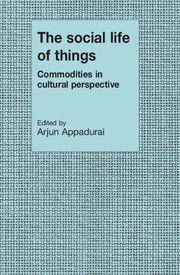Book contents
Foreword
Published online by Cambridge University Press: 05 June 2014
Summary
The genealogy of any multidisciplinary volume is likely to be complex. The immediate antecedents of this one are clear: the vision and energy of the editor, Arjun Appadurai, have sustained the enterprise from beginning to end. But it is also a cooperative effort, and the symposium and workshop that produced the individual contributions are themselves the products of an ongoing dialogue that anthropologists and historians at the University of Pennsylvania began a decade ago under the aegis of the Ethnohistory Program. The original stimulus for the program came from a shared sense that the two disciplines had much to learn from each other. Just how much we had to learn became evident only as the dialogue progressed.
Exchange of a sort had already started. Social historians in recent years have been turning to anthropology for theoretical perspectives, as they expanded their interests to include peasants, ethnic minorities – the people without history – the family, and other topics thought to be the traditional domain of anthropologists. For those who wished to do history from the inside out as well as from the bottom up, anthropology offered the necessary dimension of culture, the systems of meaning that people invest in their social forms. Anthropologists' interest in history, although not entirely new, has become more intense and of a different kind. The past, once viewed as a more or less undifferentiated prelude to the ethnographic present, has increasingly come to represent a rich storehouse of information on socio-cultural organization: empirical grist for anthropology's conceptual mill.
- Type
- Chapter
- Information
- The Social Life of ThingsCommodities in Cultural Perspective, pp. ix - xiiPublisher: Cambridge University PressPrint publication year: 1986

